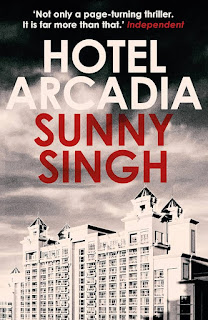 Reviewer: Catriona Troth
Reviewer: Catriona Troth
What We Thought:
Ever sat in a coffee shop and wondered about the lives of the strangers you see sitting around you?
Many writing groups have produced anthologies of short stories, and many of those have had common themes running through them. But the ten members of the Just Write group, based in Amersham, Buckinghamshire, set themselves a far more intriguing challenge.
All twenty stories in Spilling the Beans take place in a single day in the same coffee shop. And each one, from 'Ristretto' to 'Hazelnut Steamer', has the title of a drink served in the shop. More than that, the same characters weave in and out of the stories, brushing up against one another’s lives – sometimes colliding, sometimes barely noticed.
In many ways, this anthology has more in common with serial novels such as Alexander McCall Smith’s 44 Scotland Street. Many of the stories are not self contained. They leave tantalising loose threads, some of which are picked up later, while others trail out of the coffee shop into a future we are invited to imagine. Taken singly, this might make for frustrating reading, but the pleasure in this anthology comes from the way the stories weave together into a satisfying whole.
We learn about the staff, the regulars and the casual visitors – people at all ages and stages of life, from seven year old Maisie, to Maria, recollecting days in the SOE during WWII. Some of the stories brim with optimism and others are redolent with disappointment.
“He imagined freeze-drying each of these memories, reducing the essence of each cup down and capturing them somehow in his instant coffee jar, his to release ... every time he brought them to life with hot water.”
The design of the book, too, is pleasantly unified. The cover appears ring-stained from coffee mugs. Each story starts with a line drawing that matches its title, and ends with a pattern of three coffee beans. And the book itself does not End, but Close at the end of the day.
I am not surprised, therefore, to learn that this innovative compilation won Writing Magazine’s Writers’ Circle Anthology Award 2014.
Spilling the Beans is sold in aid of the Royal Marsden Cancer Charity.
Just Write’s second anthology, Delayed Reaction, was launched on Thursday 19th November, 2015.
You’ll Enjoy This If You Loved: 44 Scotland Street by Alexander McCall Smith, The Lost College and Other Oxford Stories, by the Oxford Writers Group
Avoid if you dislike: Gentle domestic dramas, stories with minimal driving plot
Perfect Accompaniment: Coffee and cake at your favourite independent coffee shop (obviously)
Genre: Short Stories.
Ebook available from Amazon Pbook available from www.spillingthebeans.org.uk
Ever sat in a coffee shop and wondered about the lives of the strangers you see sitting around you?
Many writing groups have produced anthologies of short stories, and many of those have had common themes running through them. But the ten members of the Just Write group, based in Amersham, Buckinghamshire, set themselves a far more intriguing challenge.
All twenty stories in Spilling the Beans take place in a single day in the same coffee shop. And each one, from 'Ristretto' to 'Hazelnut Steamer', has the title of a drink served in the shop. More than that, the same characters weave in and out of the stories, brushing up against one another’s lives – sometimes colliding, sometimes barely noticed.
In many ways, this anthology has more in common with serial novels such as Alexander McCall Smith’s 44 Scotland Street. Many of the stories are not self contained. They leave tantalising loose threads, some of which are picked up later, while others trail out of the coffee shop into a future we are invited to imagine. Taken singly, this might make for frustrating reading, but the pleasure in this anthology comes from the way the stories weave together into a satisfying whole.
We learn about the staff, the regulars and the casual visitors – people at all ages and stages of life, from seven year old Maisie, to Maria, recollecting days in the SOE during WWII. Some of the stories brim with optimism and others are redolent with disappointment.
“He imagined freeze-drying each of these memories, reducing the essence of each cup down and capturing them somehow in his instant coffee jar, his to release ... every time he brought them to life with hot water.”
From “Instant Coffee”, by Phil Tysoe.
The design of the book, too, is pleasantly unified. The cover appears ring-stained from coffee mugs. Each story starts with a line drawing that matches its title, and ends with a pattern of three coffee beans. And the book itself does not End, but Close at the end of the day.
I am not surprised, therefore, to learn that this innovative compilation won Writing Magazine’s Writers’ Circle Anthology Award 2014.
Spilling the Beans is sold in aid of the Royal Marsden Cancer Charity.
Just Write’s second anthology, Delayed Reaction, was launched on Thursday 19th November, 2015.
You’ll Enjoy This If You Loved: 44 Scotland Street by Alexander McCall Smith, The Lost College and Other Oxford Stories, by the Oxford Writers Group
Avoid if you dislike: Gentle domestic dramas, stories with minimal driving plot
Perfect Accompaniment: Coffee and cake at your favourite independent coffee shop (obviously)
Genre: Short Stories.
Ebook available from Amazon Pbook available from www.spillingthebeans.org.uk










